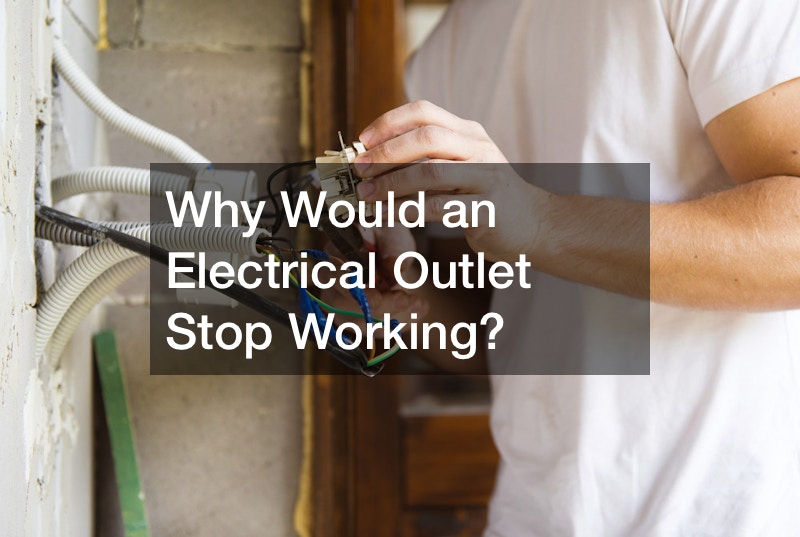
It isn’t uncommon for an electrical outlet to stop working unexpectedly. While this can cause inconvenience and even frustration, you can often try to resolve the issue before calling on an electrical technician. So, why would an electrical outlet stop working? When you know the cause, you’ll have sufficient knowledge to fix any troublesome outlet.
Overloaded Circuit

A circuit experiences overloading when the demand for electrical current exceeds its capacity. This is common when you plug in too many appliances or devices into the circuit, causing the outlet to stop working.
First, assess the outlet’s load to determine whether it’s carrying an excessive load. Consider the number of appliances or devices connected to the circuit that connects to the outlet. Did you recently add more devices or experience a power surge? It may have been the cause of the circuit’s overload.
Once you’ve figured out an overload, consider unplugging some appliances or devices that aren’t being used. You could also relocate them to different outlets on separate circuits. Distributing the load over multiple circuits prevents overloading and restores power to the affected outlet.
Faulty Outlet
Sometimes, the reason for why would an electrical outlet stop working could be that the outlet itself is faulty. Visible signs of damage imply a faulty outlet; stop using it and call an electrician to repair or replace it.
If the outlet appears in good condition, check the voltage with a multimeter. Don’t forget to turn off the power to the outlet before you conduct any tests. With the multimeter set to AC voltage, carefully place the probes into the outlet slots. If you see a 120 volt-reading, it indicates the outlet is receiving power. And if it shows an inconsistent reading or no voltage, it’s evident the outlet has failed and must be replaced.
GFCI Outlet Tripped

The GFCI, or Ground Fault Circuit Interrupter outlets, are designed for protection against electrical shock. GFCI outlets are mandated in new buildings for any outlets around six feet of any water source, such as a kitchen sink, bathrooms, etc. When a GFCI outlet detects a ground fault, it trips and shuts off power to the outlet and other connected outlets.
If the outlet that stopped working is downstream from a GFCI outlet, it may have been affected because of a GFCI outlet trip. You can check for any GFCI outlet in the circuit that has tripped and reset it to restore functionality.
For a tripped GFCI outlet, you can simply reset it by pressing the outlet’s reset button, and it will start working again. However, if it doesn’t reset and your outlet isn’t working, consider contacting a professional.
Tripped Circuit Breaker
Do you plug multiple things into a single circuit? This can cause an overload since the devices draw more electricity beyond the circuit’s capacity. This results in a tripped circuit breaker. A tripped circuit breaker is one of the more common reasons for why would an electrical outlet stop working.
Circuit breakers are designed to protect electrical circuits from shorts and overloads, among other faults. When a circuit breaker associated with an outlet trips, it cuts off power to prevent electrical hazards. You needn’t call for an electrical service for a tripped breaker; you can attempt to rectify it by yourself.
First, look at your home’s breaker panel to see if there is a tripped breaker (when the switch is in between ON and OFF). If so, you can reset the breaker; just flip it OFF and then back ON. However, if you experience frequent breaker trips, you’ll need an amperage upgrade. Call on any residential electrical contractors to have a look and work on the electrical panel upgrades.
After you’ve completed an amperage upgrade, if the breaker still trips despite you not increasing the circuit’s electricity use, it’s a sign of a dangerous electrical situation. Consider calling an emergency electrician at the earliest.
Improper Installation

While the external electrical outlet appears fairly straightforward, the electrical wiring beneath it is equally complicated. Issues with the wiring, like damaged wires, loose connections, or improper installations, can be the cause for why would an electrical outlet stop working.
If an outlet wasn’t correctly installed, it could be the primary reason for why would an electrical outlet stop working. Improper installations could be loose connections, incorrect use of wire nuts (that keep all wires covered and tied together), or backstabbing (the wire is pushed into a connector inside the device instead of using screws).
Old wires or poor wiring practices can disrupt the power supply. Whenever it concerns electrical wiring, always call a professional electrician. To find out any loose wires or improper installations, get an electrician to turn off your circuit breaker and remove the front plate of your outlet. After pulling the outlet a few inches away from the wall, they can investigate if connecting wires are loose.
Improper installations can not only cause outlet problems but can also lead to a huge fire hazard. If you can reposition the wires more closely before tightening the screws that hold them in place, and this fixes your problem, you might not need an electrician.
Worn-Out Slots
It isn’t uncommon for the metal contact points in your outlet to wear out over time, being another reason for why would an electrical outlet stop working. The grips, designed to secure the grounding, hot, and neutral prongs, can wear off, creating increased electrical resistance and heat.
This can lead to wiring issues, most likely causing the breaker to trip. You may also hear a crackling within the receptacle caused by sparking. To fix this issue, turn off the power and replace the receptacle with a new one. If GFCI and arc-fault requirements are meant to be a part of the equation, it may require bringing the new receptacle up to code.
Wiring Issues

Since electrical outlets rely on electrical wiring to carry power, an outlet’s failure could be caused by wiring issues. There’s the possibility of wiring connections becoming loose or damaged over time due to poor initial installation, pests, or vibrations.
Faulty wiring in the electrical circuit can also be the reason for why would an electrical outlet stop working. Some faulty wiring scenarios include damaged or improperly installed wiring, improper wiring configurations, or inadequate wire gauge. It’s recommended to call upon a licensed electrician to identify and rectify such issues while ensuring the safety and compliance of the electrical system.
Faulty Switch
Is the outlet that stopped working controlled by a switch? Then, a faulty switch could be the reason for the outlet failure. Malfunctioning switches can disrupt the electrical connection and prevent the outlet from working. You can simply replace the faulty switch with a new one to restore power to the outlet.
Short Circuit
When the hot wire touches the neutral wire or ground, it results in a short circuit, one of the common reasons for why would an electrical outlet stop working. The reasons for this could be loose connections, damaged wiring, or faulty devices. A short circuit often trips the circuit breaker, causing the outlet to stop working.
Blown Fuse
A blown fuse could be the reason for why would an electrical outlet stop working, especially in older homes. You can check your fuse box to confirm a blown fuse. This can be evident with a broken or cracked glass container that holds the fuse. Other times, it could appear as an ash-like residue in the glass container.
On close inspection of the box’s fuses, you’ll be able to determine the cause of the problem. And if you do have a blown fuse, you can simply replace the fuse, which is a relatively easy task. However, if there are frequent episodes of blown fuses, you might have to replace the fuse box with a circuit breaker panel.
This will require some hand tools and measurement tools with quite a bit of expertise to take up as a DIY project. Otherwise, call for electrical technicians from any reliable electrical companies near you to get it done.
Damaged Outlet
You can inspect the outlet for any signs of physical damage, like broken parts, burns, cracks, or water seepage. Remember that moisture or water damage can also be the reason for why would an electrical outlet stop working.
When an outlet carries electrical currents beyond the safe capacity, it ignites. Any burning smell, melting, or discoloration around the outlet is a red flag that the outlet is faulty. The wires on the inside of the outlet burn, leaving scorch marks on the outside as well.
If you see signs of a burnt outlet, you must never ignore the problem, as it could result in further damage or potential fire hazards. The only option is to get the outlet replaced, preferably by a professional.
Problem With the Device
Before concluding that the problem is with the outlet, consider any problem with the appliance or device you’re plugging into the outlet. It’s a more likely scenario when the outlet stops working suddenly, and the breaker hasn’t tripped.
To check if the outlet still works, you can plug another appliance into the outlet. If that works, then you can be sure that the problem lies in the device. And if you cannot see results, then try some other outlets in the room. If they’re all dead, it might be time for a professional to take a look.
Half-Hot Outlets
While similar to regular outlets, half-hot or switched outlets are ones with one plug always powered or hot, while a switch controls the other plug. Typically, the switch controls the lower plug. If you have never encountered a half-hot outlet before, it’s easy to mistake it for a faulty one.
You probably found the bottom outlet working but not the top one. Rather than jumping to conclusions about a faulty outlet, look for a switch nearby that controls the power. For a simple test, plug a lamp into the outlet you’re facing issues with and flip some switches.
If the lamp turns on, everything works fine. If it doesn’t, try another light or device that you’re certain works. If that doesn’t work, your switched outlet probably needs professional inspection.
Power Outage
A power outage or an issue with the electrical supply from the utility company itself could be the reason for why would an electrical outlet stop working. Before you assume a problem with the electrical outlet, check other outlets in your home to see if electrical devices are without power. If that’s the case, the outlet will start working once the power is restored. You can contact your utility provider to report the issue and ask about the estimated time of power restoration.
Other Possible Causes
Apart from the common reasons stated here, some other less-common factors could be the reason for why would an electrical outlet stop working. The Arc Fault Circuit Interrupter (AFCI) breakers, designed to detect dangerous arc faults that could possibly cause electrical fires, may trip. This will cut off power to the associated outlets. A simple reset of the AFCI breaker will resolve the issue.
While least expected, pests or rodents within the walls of homes can chew on electrical wires and cause electrical damage or disruption. If you suspect you have a rodent or pest problem, it’s best to contact a professional exterminator service along with an electrician to assess and repair the damage.
Finally, electrical systems are prone to wear and tear over time, more commonly with outdated components or irregular maintenance. Outlet failures are common in older homes with outdated wiring or insufficient electrical capacity. Consider electrical upgrades and even insulation contractors for a thorough inspection to address the issues.
Conclusion
Now that you’ve understood the several reasons for the question, ‘Why would an electrical outlet stop working?’ you’re all set to troubleshoot the next faulty outlet yourself before you call for an electric repair technician.


